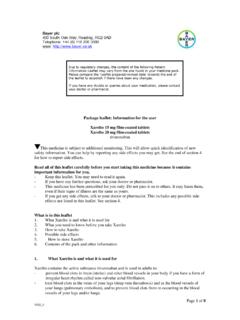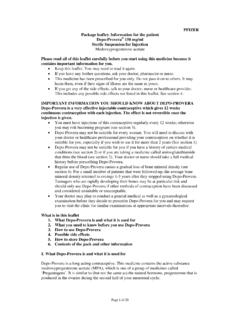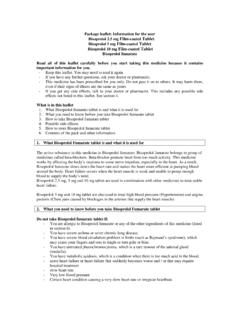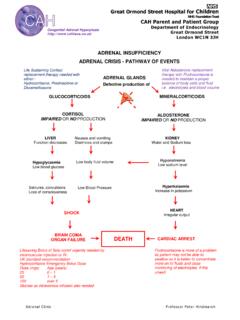Transcription of Patient Information Leaflet - Medicines
1 Page 1 of 12 Package Leaflet : Information for the Patient solu - cortef 100 mg hydrocortisone sodium succinate PFIZER Read all of this Leaflet carefully before you start taking this medicine because it contains important Information for you. Keep this Leaflet . You may need to read it again. If you have any further questions please ask your doctor, nurse or pharmacist. If you get any side effects, talk to your doctor, pharmacist or nurse. This includes any possible side effects not listed in this Leaflet . See section 4.
2 What is in this Leaflet 1. What solu - cortef is and what it is used for 2. What you need to know before you are given solu - cortef 3. How solu - cortef is given to you 4. Possible side effects 5. How to store solu - cortef 6. Contents of the pack and other Information 1. What solu - cortef is and what it is used for solu - cortef contains hydrocortisone sodium succinate. Hydrocortisone belongs to a group of Medicines called corticosteroids or steroids. Corticosteroids are produced naturally in your body and are important for many body functions.
3 Boosting your body with extra corticosteroid such as solu - cortef can help when injected by a doctor or nurse if your body cannot produce enough corticosteroid due to problems with your adrenal glands ( adrenal insufficiency). Corticosteroids can also help treat shock following surgery, injuries, hypersensitivity (anaphylactic) reactions or other stressful conditions. These include inflammatory or allergic conditions affecting the: bowel and gut Crohn s disease (inflammation of the gut) or ulcerative colitis (inflammation of the lower bowel) lungs bronchial asthma or inflammation caused by breathing in (aspirating) vomit or stomach contents skin Stevens-Johnson syndrome (an autoimmune disorder in which an immune system causes the skin to blister and peel), or systemic lupus erythematosus (lupus)
4 solu - cortef may be prescribed to treat conditions other than those listed above, such as adrenal insufficiency and other medical emergencies like treatment of shock associated with this. You must talk to a doctor if you do not feel better or if you feel worse or are unsure why you have been given this medicine. 2. What you need to know before you are given solu - cortef Page 2 of 12 Do not use solu - cortef : If you think you have ever suffered an allergic reaction, or any other type of reaction after being given solu - cortef , or any other medicine containing a corticosteroid, or any of the other ingredients of this medicine (listed in section 6).
5 An allergic reaction may cause a skin rash or reddening, swollen face or lips or shortness of breath. If you have any fungal infection (such as thrush) which is not being treated. If you have recently had, or are about to have any vaccination. See your doctor immediately if you have any of the above. Warnings and precautions Talk to your doctor or nurse before taking this medicine if you have any of the following conditions. Your doctor may also have to monitor your treatment more closely, alter your dose or give you another medicine.
6 You are suffering from a traumatic brain injury or stroke. Chickenpox, measles, shingles or a herpes eye infection. If you think you have been in contact with someone with chickenpox, measles or shingles and you have not already had these illnesses, or if you are unsure if you have had them. Severe depression or manic depression (bipolar disorder). This includes having had depression before while taking steroid Medicines like solu - cortef , or having a family history of these illnesses. If you suffer from mood swings, sleeplessness and personality changes If you are under unusual stress.
7 If you develop adrenal insufficiency. Diabetes (or if there is a family history of diabetes). Cushing s disease (a hormone disorder caused by high levels of cortisol in the blood). Epilepsy, fits or seizure Glaucoma (increased pressure in the eye) or if there is a family history of glaucoma. Cataract You have recently suffered a heart attack. Heart problems, including heart failure or infections. Hypertension (high blood pressure). Fluid retention in the body. Hypothyroidism (an under-active thyroid).
8 Pancreatitis (Inflammation of the pancreas which causes severe pain in the abdomen and back). Peritonitis (Inflammation of the thin lining (peritoneum) around the gut and stomach). Kaposi s sarcoma (a type of skin cancer). Kidney or liver disease. Muscle problems (pain or weakness) have happened while taking steroid Medicines in the past. Myasthenia gravis (a condition causing tired and weak muscles). Osteoporosis (brittle bones). Pheochromocytoma (a rare tumour of adrenal gland tissue. The adrenal glands are located above the kidneys).
9 Skin abscess. Stomach ulcer or other serious stomach or intestinal problems. Page 3 of 12 Thrombophlebitis - vein problems due to thrombosis (clots in the veins) resulting in phlebitis (red, swollen and tender veins). Tuberculosis (TB) or if you have suffered tuberculosis in the past. Caution should be exercised with corticosteroids as they can cause an eye condition (central serous chorioretinopathy) where a collection of fluid forms under the light-sensitive layer of tissue at the back of the inner eye (retina) causing visual impairment and may lead to retinal detachment.
10 Contact your doctor if you experience blurred vision or other visual disturbances. Long term therapy of corticosteroids in high doses can cause an abnormal amount of fat deposition on or outside the lining of the spine (epidural lipomatosis). Tell your doctor if you suspect an infection has occurred, as corticosteroids can make infections more likely and may mask their signs. This medicine is not recommended for injection via the spinal cord (intrathecal or epidural). Serious side effects have been reported with this use on occasions.















